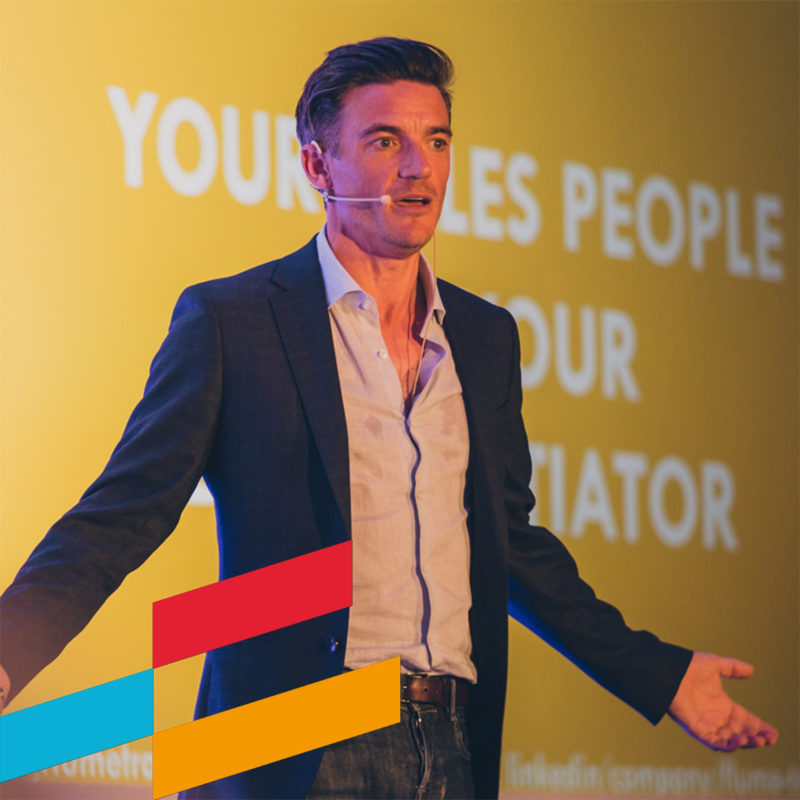How new approaches in sales training can empower media sales teams
Even before the disruption of the Covid-19 pandemic the media sales industry was having to respond to unprecedented levels of change. Legislation, such as GDPR, meant that the framework in which they operated had shifted, while some media sales teams were having to contend with a shift in emphasis from digital display advertising to other types of sales and revenue generation.
Raoul Monks, Founder and Director of Flume Training, believes that in order to keep up sales, training has to evolve too. He believes that it needs to be resolutely ROI focused, always concentrating on delivering value for the client.
At the FIPP World Media Congress, Raoul took delegates through a presentation entitled ‘2020 Sales is broken: Why an urgent change is required to drive revenue.’ You can watch that video here.
In this interview, Raoul talks about the genesis of Flume, and the issues that it was set up to address, but also how sales training has changed in recent years and what his company’s response to the Covid pandemic has been.

So tell me a bit about Flume Training? What were the key challenges you were trying to solve when you set up?
I started in media and event sales in 2008, and in 2010 I set up Flume. I worked out that a lot of the sales training that was available was great for the day the trainer was in the office, but there was very little follow up. There was a gap in the market for sales training that made a difference not just to behaviours, but also revenues and commissions.
Around that time there was a big shift in the industry. The way that clients were buying and interacting with salespeople was changing quite dramatically, and what people had been saying in training in the previous 10 years wasn’t really working anymore.
And so what I focused on was committing to understanding buyers and how they make decisions. Our ultimate belief is that the best way to make your job easy as a salesperson is to see and understand the client’s point of view. So now we ensure that the sales training or sales development we deliver actually impacts revenues.
Learn how to drive media sales in a changed world
Join FIPP and Flume Sales Training for 4 x 1-hour “Sales Accelerator” sessions, delivered weekly from 19 November to 10 December.
From building pipelines to speeding up sales decisions, the Sales Accelerator covers an arsenal of techniques you or your sales teams should be equipped with. Sign up here.
Do you mainly work with media companies or events ones?
Both as there is significant crossover between the two these days. Events companies are becoming more like media brands and media companies were, at least before Covid-19, very keen to develop their events portfolios.
The principles for a buyer are fairly similar in both media and events, which is to look at the different opportunities out there. The value is solving the challenges this presents.
So, teaching clients how to make decisions that are going to drive the results that they need to attain is central to what we do.
One of the biggest changes in sales is that it has gone from just either asking questions or pitching, to actually adding real value. So helping suppliers choose agnostically, and enabling them to make the right decisions is a massive part of that. We need to help them with best practice as well, so sharing stories about an audience, what works and what doesn’t work, and most importantly how to create an audience journey that’s actually going to drive ROI.
We work a lot with B2B companies and a fair bit with B2C as well. In both, people are selling to people to buy solutions. So, whether it’s B2B or B2C, there is a great deal that they have in common in terms of sales.
We realised that what everyone in the industry was asking is ‘how do we get through this, how do we navigate through this?’ And we took that idea and developed it.
Could you explain to me how Covid-19 has impacted your business?
We were having the best year of our lives in terms of work. It was going through the roof and we were becoming very well known for driving ROI, and being able to prove and measure it.
Once Covid-19 hit, because a lot of our clients are events and media companies, the budget for training got stalled. Like a lot of marketing budgets, they were seen as nice to have and kind of got flattened. Also, we couldn’t go to London which is where most of our work was delivered face to face. So, after two days of panicking and thinking, ‘what are we going to do?’ We came back together as a team and we focused on a purpose to work towards and work through Covid-19.
And we realised that what everyone in the industry was asking is ‘how do we get through this, how do we navigate through this?’ And we took that idea and developed it.
So firstly we looked at how we could help salespeople sell and work better with clients. Secondly we looked at how sales leaders could get more out of remote sales teams. And thirdly how to help clients pivot from live to digital.
We launched a webinar, because we realised that although people might not be prioritising paying for this stuff right now it is desperately needed and if we can help the industry get through this we’re going to come out stronger as well. For the webinar we expected between 50 and 100 people, and a week later when the webinar happened we had 1,900 people!
When do you think you’ll go back to actually kind of face to face training, do you have a plan?
We are starting to see companies wanting face to face training, especially the events companies. At the same time, there has been a shift as people have got more used to working with cameras. There are challenges to working this way. It can be exhausting for both the trainer and those being trained. Also you do get some presenteeism where they start turning up in their kitchen to do their work but they’re not really there.
I think generally the biggest challenge that most salespeople have had when it comes to working remotely is managing their time. When you are used to being in an office, working remotely is such a different experience and you need the salesperson to own what they’re doing and I think that’s a very tough thing for salespeople to do.
That said, we’ve seen some great examples of leaders who have really taken to remote working and adapted the incentives, the motivation techniques, and the communication strategies and have been very successful. There have also been others who just tried to kind of run it as they did before with mixed results.
I do however think that Covid-19 has put things in a very clear light for some companies. Before Covid-19 clients had kind of accepted a mediocre sales approach. But right now because everything has changed for them, they’re so focused on ROI and it’s so tough for them to make a decision and get it passed through so much scrutiny. There is so much risk if it goes wrong, that all they’re focused on is a watertight business case that can drive ROI and if they don’t have that they’re screwed. Focusing on sales excellence is absolutely crucial.
Because of this new sophistication, salespeople are going to be needed to act intelligently. It is not just phoning someone up and saying ‘do you want space?’
How do you think media sales will evolve in the future?
I think companies that don’t adapt are really really going to struggle if their approaches and their sales experience isn’t strong enough. Also, I think that clients are going to be focusing on ROI more than ever before, they’re going to need proof for everything to get a business case through. So I think media sales is going to have to become more sophisticated.
Media and events companies are evolving processes to genuinely drive and deliver ROI. Because of this new sophistication, salespeople are going to be needed to act intelligently. It is not just phoning someone up and saying ‘do you want space?’ We’ve got to be teaching, collaborating, taking the lead, and personalising the conversation. I’ve always felt like media sales has been something a lot of people in England aren’t proud of doing
My take is that because of the sophistication necessary, and the rigour needed for the ROI processes, people are going to be very proud to be in there because you’ve got to be bloody good to do it.
Learn how to drive media sales in a changed world
Join FIPP and Flume Sales Training for 4 x 1-hour “Sales Accelerator” sessions, delivered weekly from 19 November to 10 December.
From building pipelines to speeding up sales decisions, the Sales Accelerator covers an arsenal of techniques you or your sales teams should be equipped with. Sign up here.








